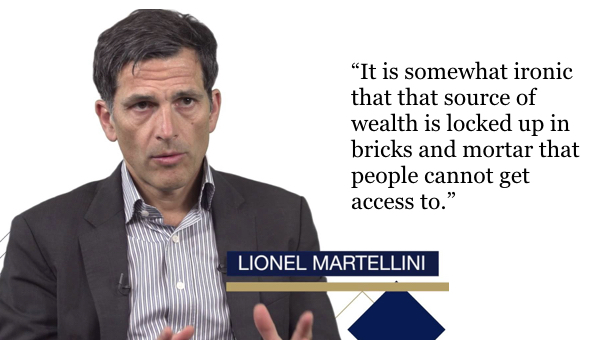This may be why so many advisors ignore what is most often their client’s largest asset.
Continue readingUnlocking Hidden Retirement Cash
Innovation continues despite an uncertain housing and real estate market. One such product could be seen as a reverse mortgage in your pocket
Continue readingTwo things that should be in every retirement plan
Two assets are typically ignored in retirement financial planning. One is Social Security claiming, that is the most advantageous way to structure Social Security benefit payouts. The other is…
Continue reading5 Questions Homeowners are Asking Before Retiring
The 5 Questions Your Sixty-Something Homeowners are Asking? Are you prepared?
It’s not a mistake that the age of eligibility for the federally-insured reverse mortgage is 62. Americans in their sixties begin to seriously consider the merits of continued full-time work against the rewards of a more leisurely lifestyle. Here are five factors each pre-retiree is likely to contemplate before bidding farewell to report to work each day.
First is their retirement readiness. One facet that’s typically ignored in favor of crunching numbers is psychological preparedness. Newly retired individuals can begin with feelings of excitement and anticipation only to fall into a morass of depression, anxiety, and restlessness. Aging expert and author Sources of Income/Cashflow says, “people spend more time planning a wedding than planning retirement. It’s very important to think about your identity and what you’re losing, and how you get a new identity. What would give you a sense of meaning and purpose?” Next is financial readiness which is typically determined by creating a post-employment budget. This will include reliable sources of monthly income throughout their retirement years. The good news is their expenses may be considerably less when factoring in they’re no longer raising children or incurring ongoing costs related to employment such as transportation.
[read more]
Second, are sources of income and cash flow. Some may decide not to completely disavow employment and instead find part-time work. One retiree I know took a job at the local historical society- a job she finds much more enjoyable than her previous career. Typical income sources are defined pension benefits, investment dividends or distributions, royalties, Social Security, and distributions from 401(k)s and IRAs. The magic of the reverse mortgage is that it can help close many gaps in monthly cashflow that are often found when considering retiring. A portion of the home’s illiquid value is converted into an available standby line of credit, monthly tenure payment, or simply retires the burden of an existing monthly mortgage payment. Of course, those pesky property taxes and insurance do remain until death or home do you part.
The third question almost every soon-to-be retiree faces is when to begin taking Social Security benefits and that question hinges on whether to take full or reduced benefits. As the ratio of retirees to active workers continues to grow Uncle Sam has moved the goalposts over the years with those born before 1938 being able to take full benefits at the age of 65, and younger retirees seeing a graduated reduction based on age. Some look to not only their need for the monthly benefit but their likely life expectancy with those in poorer health opting to start sooner rather than risk dying before collecting a full benefit. As a reverse mortgage professional you will want to avoid giving advice on when to begin drawing benefits, but again, knowing the considerations involved is useful to understand the homeowner’s mindset.
The fourth consideration revolves around Medicare. Fewer workers are retiring with a medical insurance benefits package. The good news is they can enroll in Medicare at the age of 65 and purchase a Medicare supplement policy that is typically much less expensive than the private insurance premiums they would pay individually.
Fifth, and lastly are Required Minimum Distributions. Did you know that while 401(k) and IRA deductions reduce taxable income distributions must be taken to avoid penalties, in many cases up to 50%?! For decades retirees had to begin taking distributions or payouts from these accounts at the age of 70 1/2. However, thanks to the 2019 SECURE Act and increasing life expectancy that age is 72. Some younger retirees in their early sixties have postponed taking money to avoid more taxable income from these accounts while allowing them to grow by using a reverse mortgage. Either way, the money must be systematically withdrawn.
Understanding these five factors can help reverse mortgage originators increase their confidence when working with both financial professionals and homeowners. Be mindful to stay in your lane not providing unlicensed advice but also recognize that your foundational grasp of these basic concepts will not go unnoticed. It will help not only build rapport but trust and efficiency in helping shape a plan that best meets the need of the homeowner.
[/read]
RMs Getting a Serious Second Look
The reverse mortgage market got some new respect earlier this year. When it looked like…
Continue readingHere’s what’s wrong with retirement planning
Retirement planning requires a solution-based approach
“It’s ironic that the biggest source of wealth is locked up in bricks & mortar…”
 While more financial professionals are embracing the HECM, ironically our cousins across the pond seem to better grasp the concept of home equity management and its role in funding retirement. Is today’s choice of retirement investment vehicles adequate to meet the needs of today’s savers and retirees? Can asset management live up to it’s name without including a retiree’s largest tangible investment?
While more financial professionals are embracing the HECM, ironically our cousins across the pond seem to better grasp the concept of home equity management and its role in funding retirement. Is today’s choice of retirement investment vehicles adequate to meet the needs of today’s savers and retirees? Can asset management live up to it’s name without including a retiree’s largest tangible investment?
Hedgeweek is a blog for hedge fund managers and institutional investors…the big players. Moving in the deep waters of asset management, their recent post recognizes challenges similar to those faced by American retirees seeking to fund retirement. Beyond a lack of saving, individual investors are stymied with a choice of investment products that may not meet their needs.
[mailmunch-form id=”538935″]
Using a HECM Instead of Long-Term Care Insurance
One Financial Planner Suggests Two LTC Insurance Alternatives
 If you were to eavesdrop on a typical meeting with someone in their 50’s with their financial advisor, chances are you would here the sensible advice to purchase long term care insurance. This practical recommendation is rooted in the fact that nearly 70% of those aged 65 and older will need long term care services at some point in their lifetime. However skyrocketing long term care premiums has one financial planner recommending alternatives.
If you were to eavesdrop on a typical meeting with someone in their 50’s with their financial advisor, chances are you would here the sensible advice to purchase long term care insurance. This practical recommendation is rooted in the fact that nearly 70% of those aged 65 and older will need long term care services at some point in their lifetime. However skyrocketing long term care premiums has one financial planner recommending alternatives.
George Gagliardi is a certified financial planner focused on creative solutions to help preserve and grow his clients’ assets. A recent MarketWatch article shows that Gagliardi is skeptical of traditional retirement advice when it comes to protecting his client’s assets from the ravages of health emergencies and long-term care costs. Long term care costs are not the only threat, the other is the risk of exploding premium rates. Federal employees participating in the long-term care insurance program learned this harsh lesson in 2016 when their premiums jumped 126%. Two choices were offered- pay the higher premium and retain your current coverage or pay the same premium for less coverage. A spike in premiums had a direct impact on a senior’s cash flow and quality of life.
Few financial planners stray from conventional recommendations and approaches to asset management and preservation. Unfortunately, conventional wisdom yields typical results. Gagliardi takes a different approach favoring two alternatives: hybrid long term care policies and the Home Equity Conversion Mortgage.
A Perversion of the HECM?
AARP Frowns Upon Strategic Use of HECM in Portfolio Management
 Creativity unlocks potential markets and opens up possibilities. It also makes you a target of critics. In recent years the long overlooked principal limit growth factor (or as many refer to it as the line of credit growth rate) has garnered a second look by financial professionals and our industry as a potential means of managing risk in a retirement portfolio.
Creativity unlocks potential markets and opens up possibilities. It also makes you a target of critics. In recent years the long overlooked principal limit growth factor (or as many refer to it as the line of credit growth rate) has garnered a second look by financial professionals and our industry as a potential means of managing risk in a retirement portfolio.
“The use of reverse mortgages to hedge investment portfolios is a perversion of the original intent of the HECM Program, a misuse of FHA insurance, and puts the FHA insurance fund,” wrote AARP in a recent post. “HUD should take steps to ensure that homeowners who need money have access to HECMs, but should prohibit the use of HECMs for portfolio hedging.”
A perversion of the HECM program’s original intent? We have revisited the Home Equity Conversion Mortgage’s intent citing the language in which the program was created. Nowhere does it mention…
Looking for more reverse mortgage news, commentary, and technology? Visit ReverseFocus.com today
Transitioning Into Retirement
8 Ways to Ease the Shift
Everybody talks about being retired, but less common is the in-between period when you may no longer be working full-time, yet are not what you might consider “senior” (especially as this definition keeps getting revised upwards!). How can you help the reverse mortgage clients and prospects you serve (and perhaps their Boomer children) to ease the transition into retirement?
Life shifts can be tricky to navigate, at every stage. I remember thinking, a few weeks after starting my first professional job, “Is this all there is?” I was surprised that I felt like a fish out of water, since I’d worked since age 15. But this felt like the true end of childhood, and all I could think was, “Do I have 40 more years of 8 to 5 to look forward to?”
Re-tire Your Career Wheels and Tread A New Path
 At the other end of the career spectrum, similar feelings may arise. No matter how illustrious one’s career — in fact, the more notable someone’s career path, the more challenging retiring may appear — at some point, most people will surrender this role for the mantle of retiree. It’s only the exceptional who are still teaching, inventing worthwhile products, or practicing medicine well into their eighties and nineties, though this number is also likely to increase along with healthy longevity.
At the other end of the career spectrum, similar feelings may arise. No matter how illustrious one’s career — in fact, the more notable someone’s career path, the more challenging retiring may appear — at some point, most people will surrender this role for the mantle of retiree. It’s only the exceptional who are still teaching, inventing worthwhile products, or practicing medicine well into their eighties and nineties, though this number is also likely to increase along with healthy longevity.
Some of the best retirement wisdom comes from those who’ve been there. Ninety-year-old author and former war correspondent Roy Rowan writes, in Never Too Late: “Living happily without your old job title can be made easier by re-tiring the wheels of your career, so to speak, and driving off in a new direction.”
And this 86-year-old counsels retirees (or anyone in the second half) to ask themselves the one question that will change your life.
Here are eight practical suggestions to help your reverse mortgage clients — and the younger generation — prepare to transition into retirement:
1. Volunteer! From libraries, schools, and animal shelters to digital creativity (blogs, webinars, social media…), there are myriad ways to share your wisdom and support, online and in the physical world.
2. Launch a flexible, part-time gig from home, such as a neighborhood dog walking service.
3. Create a daily/weekly structure to stay healthy and engaged, including such staples as exercise, journaling/meditating or similar, and social activities.
4. Develop a daily check-in with a friend who is also about to retire, or one who has already retired and can support your transition.
5. Enroll in a lifelong learning course through such schools as the Osher Lifelong Learning Institute (OLLI) part of UC Berkeley, or the Fromm Institute for Lifelong Learning at the University of San Francisco.
6. Explore The Transition Network, a national resource for women 50+.
7. Join or start a Meetup group that fits your interests, whether that’s dance or dream interpretation, hiking or Ham radio.
8. Become digitally literate. Now that you have the time, you might be amazed by what you can do on your laptop or smartphone. Resources such as New York’s Senior Planet Exploration Center call it “aging with attitude”!
Finally, maintain (or develop) your sense of humor most of all. While few of the chronologically gifted might wish to star in these movies, some of the titles are an lol (laugh out loud).










